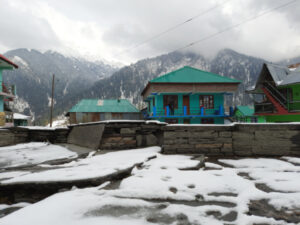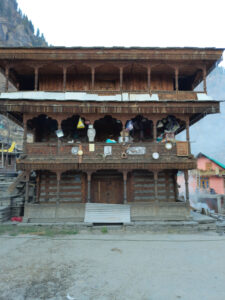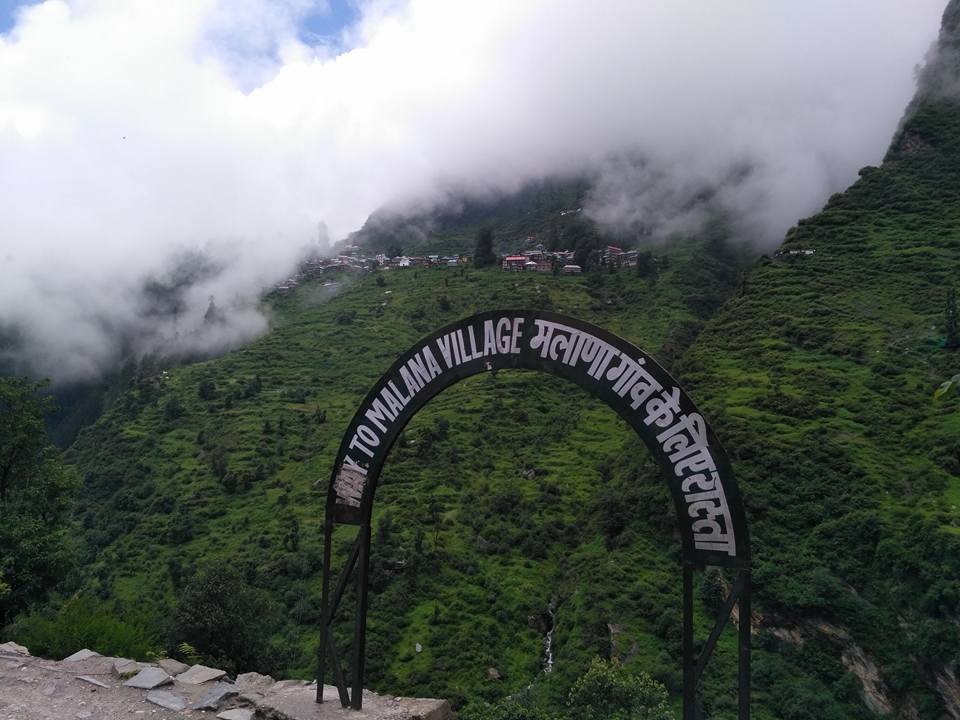A secluded haven called Malana
Today perhaps Himachal Pradesh is best known as the place where the Tibetan spiritual leader Dalai Lama lives. But thousands of years ago, legend has it, it was also the place where soldiers of Greek King Alexander the Great lived.
The story goes when Alexander’s army took refuge in the small village of Malana in the Kullu valley in 326 BC after losing a battle with the Indian king Porus, the Greek soldiers decided to stay there, leading to the birth of Malana and its people.

Malana during peak winter season (Photo: Jay)
Numerous folktales have emerged around this legend, helped by the fact the physiographical features of most residents of Malana don’t look like that of any Indian community, but resemble those of Greeks, instead. Their language, Kanashi is a unique language, known only to the residents of the village. They also follow a local system that is more Greek than Indian in both style and system. The Malana residents have also, rather curiously, cut themselves off from the outside world, with little contact with anyone not resident there.
Due to all these factors, besides the beauty of Malana itself, it has become a popular spot for tourists to explore. “The village started to open up to the outsiders gradually, around 15 to 20 years ago,” says Nitin Sharma, 39, who runs a taxi service in Kullu. “Since then, big crowds have come in to explore the place, and the villagers are also gradually opening up to the rest of the world.”
Trekking and hashish
A huge number of tourists turn up to explore the once isolated village. Whether it be for trekking or for the village’s famous Malana Cream (hashish), it has started to pull a huge number of visitors in. Trekking up several trails, surrounded by nature, green lush and mountains, away from the hustle and bustle of the city, is indeed one of the biggest pulls of the village.
The other attraction is not so innocent though. The locally-produced hashish, called Malana Cream, is amongst the most expensive drugs as the cannabis that grows in the Parvati valley is believed to be of very pure quality and visitors from across the world descend upon the village to sample some in its purest form.
Touch-me-not
Even though the villagers are more welcoming of the outsiders from the last decade or so, there are still some norms that need to be followed by visitors. “Tourists can go tour the village if they want,” says Jay Chaurasia, who runs The Marley Shed, a backpackers’ hostel just outside the village, “but they are strictly prohibited from touching anything. Even if you want to buy something, you need to put the money on counter, instead of handing it over to the shopkeeper to eliminate any chances of physical contact.”
“The villagers believe themselves to be superior to others,’’ Chaurasia tells Media India Group, adding, “they have viewed the outsiders as inferiors for a very long time. But now that they have opened their doors to the rest of the world, it will change slowly.”
Indeed, things are changing. In the last decade or so, Malana has seen considerable development after interacting with the outside world and repeated trips from government officials.
Jamalu Devata

At Jamalu Devata’s Temple in Malana outsiders are nor allowed to enter or touch it (Photo: Jay)
Most likely than not the first thing you hear when you enter the Malana is about their Jamalu Devata. An all-knowing deity that makes every major decision related to the village and its people.
“The perhaps the biggest no-no is that the visitors are not allowed to enter the Jamalu Devata’s temple no matter what, and if they do, they will have to pay a fine,” says Sharma.
Norms and traditions are quite well documented by people who have visited the place. “Their customs and traditions are quite rigid,” says Ayushi Vyas, a 26-year-old YouTuber. “Every single rule laid out by the residents has to be followed. But it is because they want to preserve their traditions and culture,” she adds.
Chaurasia says that all the cafes and hostels are outside the village because tourists aren’t allowed to stay in the village. But that hardly seems to hinder the interest of the outsiders, in fact it seems like it has fueled people’s curiosity instead, especially amongst the foreigners, “The foreign crowd used to make up around 70 pc of the whole tourist contingent before Covid-19. In fact, Malana was made famous by them and only as recently as 2014-15 have Indian visitors started to show interest in it.” Jay adds.
Before the village’s tourism sector took off, the local economy was mostly based on farming and making shoes and sandals from the cannabis plant, that is native to this land. “Their economic condition was not very good while they remained secluded from the world,” says Sharma. However, Chaurasia thinks otherwise. “Their financial condition was mostly based on farming and selling local herbs. Tourism obviously boosted the financial status of these people but even before they were plenty rich,” he insists.
And the small village is not going to see the flood of tourists dry up anytime soon as it offers one of the best trekking experiences in the region.
It is not known if the folktales about the Malana residents being descendants of Alexander’s soldiers are true or not, or if the Jamalu Devata is really an all-powerful deity that his believers say he is. But it is for sure that Malana’s story, mystery and history has intrigued the outside world.










